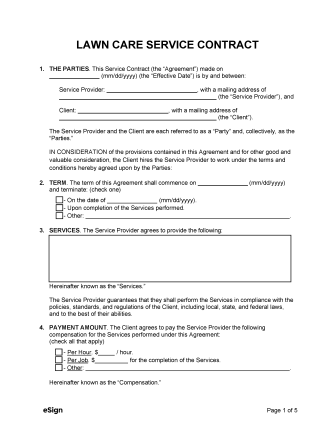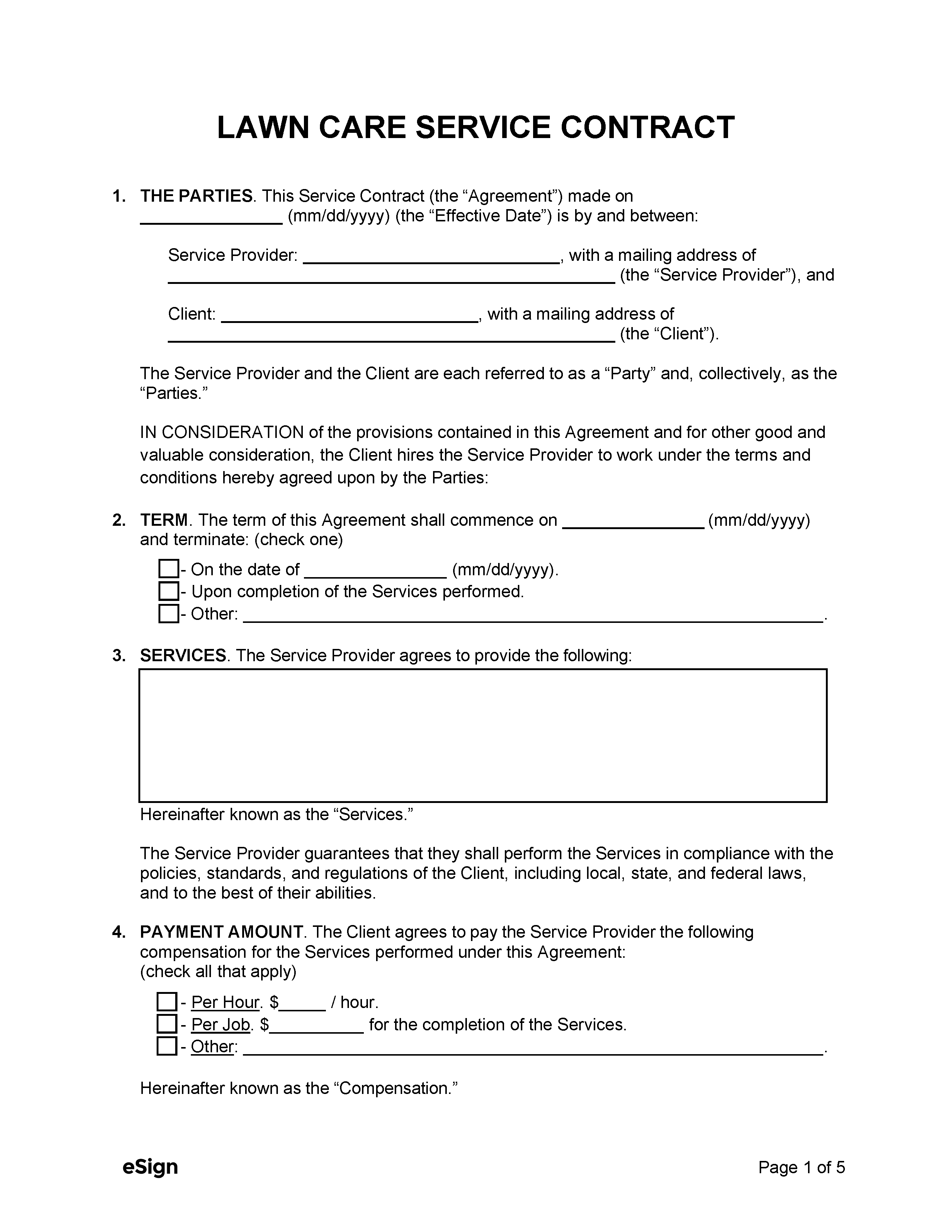Benefits of a Service Contract
Creating a written agreement between a lawn care service provider and a client sets clear expectations about what work will be done and how much it will cost. It also clarifies that the provider is an independent contractor, not an employee of the client.
An agreement also offers proof of the terms agreed to by the parties in case of any legal disputes.
Lawn Care Contract Details
A service contract for a lawn care provider should include:
Type of Service
Lawn care service contracts vary depending on the needs of each client and their property. Service providers can be hired to complete any of the following tasks:
- Lawn mowing
- Weed whacking
- Fertilization and mulching
- Flowerbed maintenance and weed control
- Trimming and pruning trees, hedges
- Maintaining irrigation systems
- Pool maintenance
- Pest control
Cost
The agreement will always mention the amount the lawn care specialist charges for their time and any other additional costs. How they’ll be paid should also be included.
Scheduling
If the property requires routine maintenance and the provider has to follow a schedule, it should be noted in the agreement.
Sample
Download: PDF, Word (.docx), OpenDocument
LAWN CARE SERVICE CONTRACT
1. THE PARTIES. This Lawn Care Contract (the “Agreement”) made on [MM/DD/YYYY] (the “Effective Date”) is by and between [CONTRACTOR NAME], with a mailing address of [CONTRACTOR ADDRESS] (the “Contractor”), and [CLIENT NAME], with a mailing address of [CLIENT ADDRESS] (the “Client”).
2. TERM. The term of this Agreement shall commence on [MM/DD/YYYY] and terminate on the date of [MM/DD/YYYY].
3. SERVICES. The Contractor agrees to provide the following: [DESCRIBE SERVICES TO BE PERFORMED]. Hereinafter known as the “Services.”
4. PAYMENT AMOUNT. The Client agrees to pay the Contractor $[RATE]/Hour for the Services.
Hereinafter known as the “Compensation.”
5. PAYMENT METHOD. The Client shall pay the Compensation every week, beginning on [MM/DD/YYYY].
6. SCHEDULE. The Service Provider will adhere to the following maintenance schedule: [DESCRIBE MAINTENANCE SCHEDULE].
7. INSPECTION OF SERVICES. Any Compensation shall be subject to the Client inspecting the completed Services provided by the Service Provider. If any of the Services performed by the Service Provider pursuant to this Agreement are defective or incomplete, the Client shall have the right to notify the Service Provider, at which time the Service Provider shall promptly correct such work within a reasonable time.
8. INDEPENDENT CONTRACTOR STATUS. The Contractor, under the code of the Internal Revenue Service (IRS), is an independent contractor and neither the Service Provider or their employees or contract personnel are, or shall be deemed, the Client’s employees.
9. ADDITIONAL TERMS AND CONDITIONS. [ADD ADDITIONAL INSTRUCTIONS, TERMS, CONDITIONS].
IN WITNESS WHEREOF, the Parties hereto agree to the above terms and have caused this Agreement to be executed in their names.
Client’s Signature: _________________________ Date: _______________
Printed Name: _________________________
Contractor’s Signature: _________________________ Date: _______________
Printed Name: _________________________

